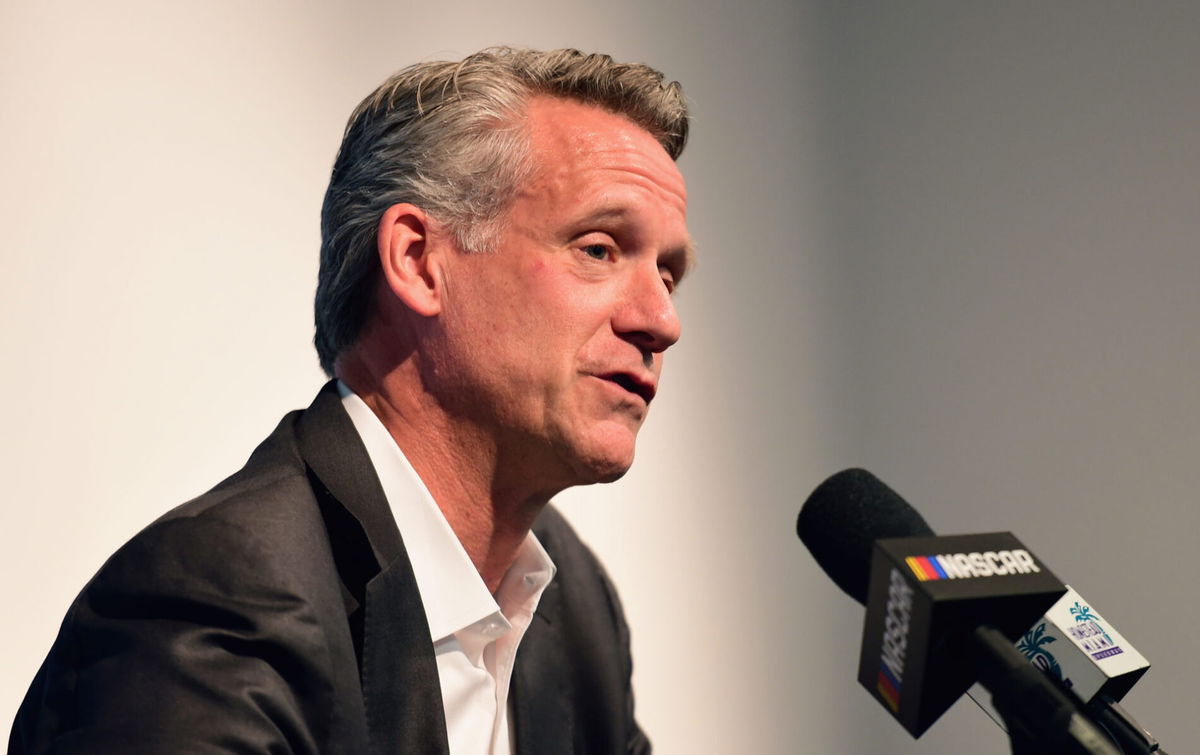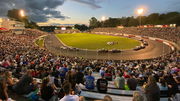
Getty
HOMESTEAD, FL – NOVEMBER 18: NASCAR President Steve Phelps speaks to the media prior to the Monster Energy NASCAR Cup Series Ford EcoBoost 400 at Homestead-Miami Speedway on November 18, 2018 in Homestead, Florida. (Photo by Jared C. Tilton/Getty Images)

Getty
HOMESTEAD, FL – NOVEMBER 18: NASCAR President Steve Phelps speaks to the media prior to the Monster Energy NASCAR Cup Series Ford EcoBoost 400 at Homestead-Miami Speedway on November 18, 2018 in Homestead, Florida. (Photo by Jared C. Tilton/Getty Images)
Picture this: It’s 2004, and you’re the leading stock car racing organization in the world, Matt Kenseth just won the 2003 NASCAR Cup series championship with ruthless consistency despite scoring just a singular win through the course of the season. Meanwhile, the man who many deem to be the more worthy champion based on the strength of winning eight races, Ryan Newman, faltered at the end due to multiple DNFs (Did-Not-Finish). As a result, the viewers are a bit ticked off, TV ratings are dipping and you need to come up with a way to keep the sport alive while maintaining competitiveness. Enter the play-off system.
Watch What’s Trending Now!
Ever since the introduction of the playoff format for the NASCAR series, it’s undergone a multitude of variations. The latest set of rules introduced in 2017, ensures that no matter how dominant one driver and team may be over the regular season, the championship will always be decided at the final round of the season. And while that’s great, in theory, for keeping uncertainty and excitement at a constant high, the format has come under a lot of fire from fans and drivers alike. However, in a recent press conference, NASCAR COO Steve O’Donell and President Steve Phelps made one thing clear. The format isn’t going anywhere.
ADVERTISEMENT
NASCAR’s top brass respond
NASCAR President Steve Phelps kicked off his annual State of the Sport address with a clear message: NASCAR is “resilient and growing.” Speaking at Phoenix Raceway on Friday morning, Phelps set a positive tone as he highlighted the sport’s bounce-back after a season plagued by weather disruptions that impacted TV ratings for some of its biggest races. But the real fireworks came when Phelps and NASCAR Chief Operating Officer Steve O’Donnell tackled some of the sport’s most pressing controversies head-on.
Phelps wasted no time addressing critics who questioned the legitimacy of this year’s Championship 4 drivers in NASCAR’s top three series. Social media has been abuzz with claims that some drivers didn’t truly “earn” their spots in the title races. But Phelps pushed back firmly against those accusations, reminding everyone that the rules were the same for all drivers from the start of the season. “What I would say is that all of our drivers knew the format,” Phelps stated. “These drivers in all three national series competed and went to the highest level, and they deserve to be here.”
He went on to spotlight each of the Cup Series finalists: Ryan Blaney, last years Champion who fought his way in this time around with a clutch win, just as he did last year; Tyler Reddick, the Regular Season Champion who secured his spot with a late-season victory; Joey Logano, a two-time Cup champion with a win-and-you’re-in mentality; and the rising star, William Byron, who showed remarkable consistency to point his way into the final four. “All four of these drivers deserve to be here. Full stop,” Phelps declared, leaving no room for doubt.
ADVERTISEMENT
Phelps: “The format is the format. We’re not the only sport.”
O’Donnell: “We’re not going to go away from the playoffs.”
— Jordan Bianchi (@Jordan_Bianchi) November 8, 2024
Steve O’Donnell took the stage next, tackling another hot topic: the Round of 8 elimination race at Martinsville Speedway. It was where several teams received penalties for manipulating the race’s outcome. It was a move that had NASCAR officials seeing red.“What I saw at Martinsville pissed me off, and it pissed everyone off at NASCAR,” O’Donnell said bluntly. “We know better, and we know what happened. We have rules in the rule book where we can address it, and we did. And yes, we’re putting new rules in place next year to ensure this doesn’t happen again.”
ADVERTISEMENT
O’Donnell emphasized that NASCAR will continue to refine its playoff format, but the overall structure of the postseason is here to stay.
Top Stories
“I’d Be Dead”: NASCAR Legend Credits Kevin Harvick for Saving His Life

Chaotic Brawl Breaks Out at Tulsa Shootout After Teen Flips Off Rival Driver

Historic NASCAR Track to Change Its Iconic Name as City Council Moves to Auction It Up

“I’m Worried” – Ross Chastain Confesses Fears of Triggering Michael Jordan’s Lawsuit Wrath With Humble 3-Word Claim

Fans Demand New List of Tracks to Be Added to NASCAR Schedule

A refresher on what the play-offs are and why it’s been getting hate
As mentioned earlier, NASCAR revamped its playoff format to create a more exciting and competitive conclusion to the season, similar to playoff systems in other sports. The Cup Series regular season consists of 26 races, after which the top 16 drivers advance to the playoffs based on race wins and overall points. To earn a spot in the playoffs, drivers should prioritize winning races, as each victory secures 5 playoff points, while stage wins during races add 1 playoff point each. The regular season champion also earns a significant boost with 15 additional playoff points. These points provide drivers with a head start in the playoffs and carry through the first three elimination rounds.
ADVERTISEMENT
The playoffs are structured into four rounds: the Round of 16, Round of 12, Round of 8, and the Championship 4. Each of the first three rounds features three races, with four drivers eliminated at the end of each round. Drivers can advance to the next round by winning any race within that round or by accumulating enough points. The final round, known as the Championship 4, is a single, high-stakes race where the top four drivers compete head-to-head for the title. All points are reset for the final race, and the highest finisher among the Championship 4 is crowned the NASCAR Cup Series Champion. Now onto why everyone hates it.
The old points system rewarded a driver’s consistency over the season. Now, a driver could snag a playoff spot with just a few wins, even if they weren’t consistently strong. Critics argued this “win-or-bust” approach sacrificed the sport’s essence, favoring flashy victories over steady performance. This year, this specific critique has been levied at a driver like Joey Logano who, despite being a two-time Cup series champion and no doubt a great driver, has had a very inconsistent, subpar 2024. However, his win in Vegas has seemingly eradicated all his shortcomings and locked him into the final four.
The elimination rounds, especially the one-race Championship 4 finale, was another hot topic. Imagine dominating all season only to lose the title because of one bad race—whether due to a wreck, a blown tire, or just plain bad luck. Sure, it adds drama, but some felt it was a little too random for crowning a season-long champion. Recently Jesse Love, the uber-talented Xfinity series rookie, called the event a “Mickey Mouse race” that is doomed to leave quite a few drivers and fans upset with the outcome. Many have argued that such a system, while it may work for other major sports like basketball or soccer, has no place in motorsport as it makes no sense. In those sports, teams play each other one by one to determine who the best is. Whereas when it comes to racing, every single team is constantly competing against each other every single race.
ADVERTISEMENT
ADVERTISEMENT
ADVERTISEMENT
ADVERTISEMENT

